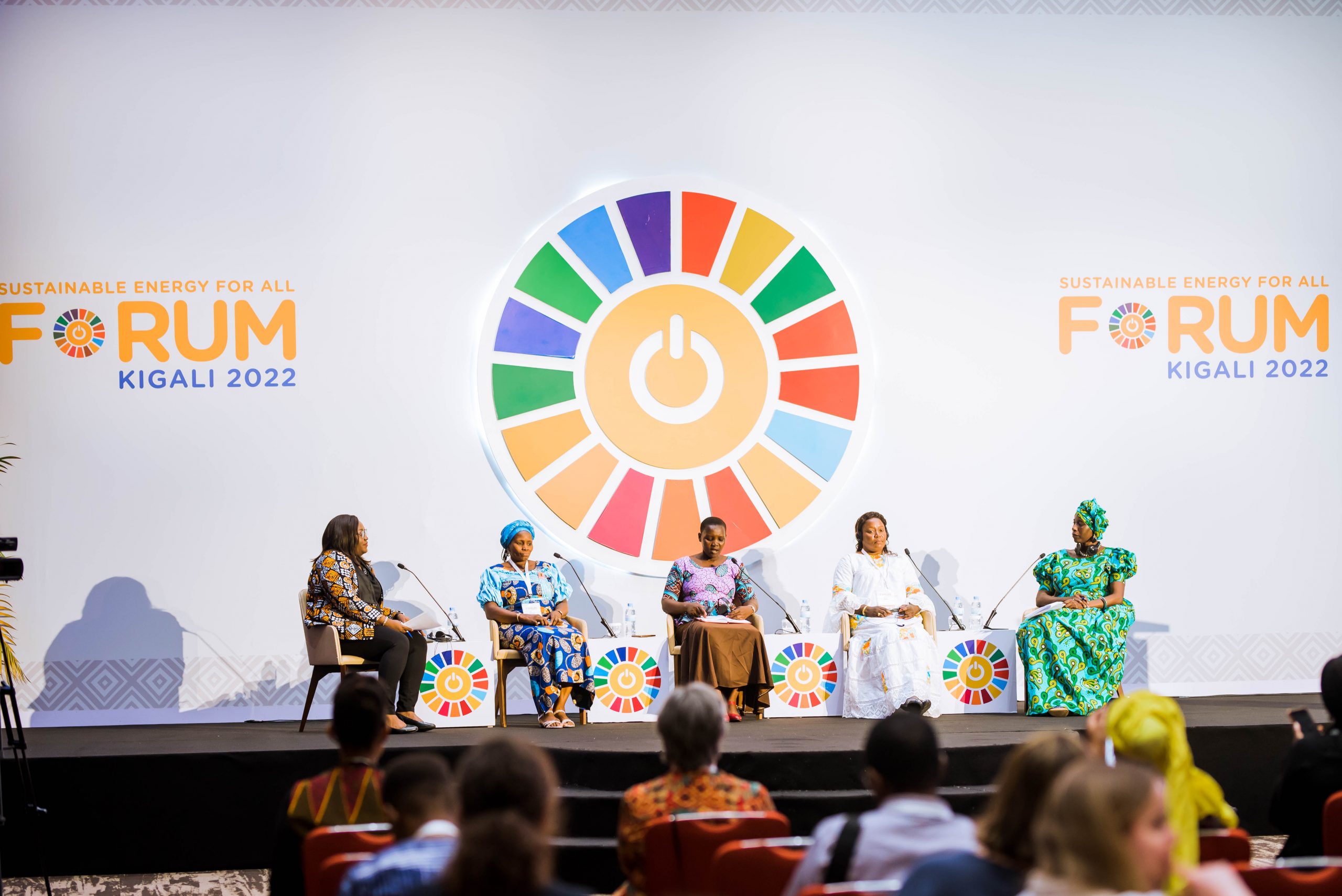This blog has been developed by ENERGIA, UNIDO and GWNET and is also posted on the Gender and Energy Compact website.
The Gender and Energy Compact strives to catalyze action towards gender equality and women’s empowerment. In doing so, the signatories and supporters want to accelerate a just, inclusive and sustainable energy transition.
This month, we participated in a number of events to continue spreading our message and gathering efforts from all sectors of society.
Launch of the UN-Energy Plan of Action and the Energy Compact Action Network
As a recently launched multi-stakeholder mechanism that brings together governments, businesses and other civil society partners, the official Launch of the UN-Energy Plan of Action and the Energy Compact Action Network was held virtually on 4 May. The Gender and Energy Compact has been spotlighted together with three other Energy Compacts – selected amongst a total of 164. Joined by Mollie Johnson from the Government of Canada, Paul Mbuthi, Deputy Director of Renewable Energy, Ministry of Energy, from the Kenyan Ministry of Energy, Shakti Ramkumar, Director of Communications and Policy at Student Energy, Sheila Oparaocha, Director, at ENERGIA, and Ceclia Ugaz Estrada, Director of Gender Equality and Empowerment of Women at UNIDO, the discussion highlighted the Compact’s main goal to catalyze action towards gender equality and women’s empowerment to accelerate a just, inclusive and sustainable energy transition. “Gender should remain at the heart and the centre of all our energy work,” emphasized Paul Mbuthi. Shakti Ramkumar stressed that “we need to make sure we are not replicating the same injustices that exist in our current energy system in order to build a more sustainable and equitable system.” She raised that it is crucial for young women to actually engage in the building and implementation of these solutions. Mollie Johnson highlighted the efforts to develop tangible tools for governments and companies to break down the barriers which exist in the sustainable energy transition, to ensure that women take up leadership roles, have decision making power and equal opportunities to access funding. In closing, Ceclia Ugaz Estrada highlighted how “some impacts of the climate crisis are already irreversible, but it is not too late to take action. The Gender and Energy Compact is a collective effort to ensure that women and girls can equally lead, participate in and benefit from sustainable energy solutions”. She invited organizations, private sector, networks, youth coalitions and stakeholders to join the Compact by concluding with the following words: “Let us jointly make the just, inclusive and sustainable energy transition a lived reality”.
For more information please visit: https://media.un.org/en/asset/k13/k13hjztgqi
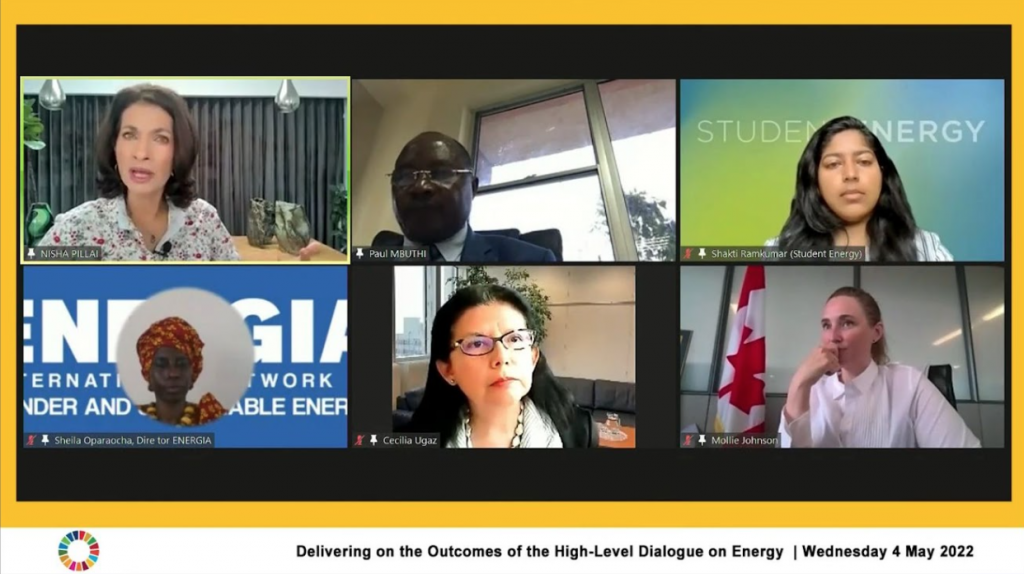
2022 Science, Technology and Innovation Forum
To further advance our message, the Gender and Energy Compact was the central topic of UNIDO’s co-led side event at the 2022 Science, Technology and Innovation Forum. Moderated by Leena Srivastava, Deputy Director General for Science, IIASA, the event focused on women’s challenges and opportunities in the STEM field. While science must be the basis for the formulation of environmental policies that are gender-responsive, scientific developments are often gender-blind. In this respect, the panelists identified the need for a significant and determined push to raise the importance of gender equality in all sectors, and especially in science and energy-related sectors, as well as to increase the availability of gender-responsive data and information. Knowledge is socially constructed – as a society we must hence actively include and apply a gender lens in our work. Leanne Williams, Lead Analyst at the World Biogas Association, advocated for inclusive workplaces and opportunities to network as paramount to increase women’s representation in STEM fields: gender equality policies, work-life balance measures, leadership support and career development programmes, as well as dedicated mentoring for women and funding are needed to increase the number of women leaders and agents of change in the energy sector.
In her opening remarks Cecilia Ugaz Estrada, Director of Gender Equality and Empowerment of Women Office and Special Advisor, Office of the Managing Director, Directorate of Corporate Management and Operations at UNIDO highlighted the importance of sustainable energy as well as enhancing gender equality and women’s empowerment in science, technology, and innovation, for a sustainable and inclusive recovery from COVID-19 and the achievement of the SDGs.
Joined by Sadikshya Aryal, Co-Founder/Managing Director at Himalayan Innovations, Dr. Milagros de Camps, Vice Minister for International Cooperation, Ministry for the Environment and Natural Resources of the Dominican Republic, Dr. Magi Matinga, Senior Technical Advisor for ENERGIA, and Dr. Victoria Plutshack, Senior Policy Associate of the James E. Rogers Energy Access Project at Duke , the Compact’s Champions reflected on the unprecedented opportunity that our coalition offers to take action in empowering women and closing the gender gap. As a result key recommendations have been formulated.
For more information, please visit link: https://www.unido.org/our-focus-cross-cutting-services-gender-equality-and-empowerment-women/events and recording here: https://www.youtube.com/watch?v=Op89t_37VGM.
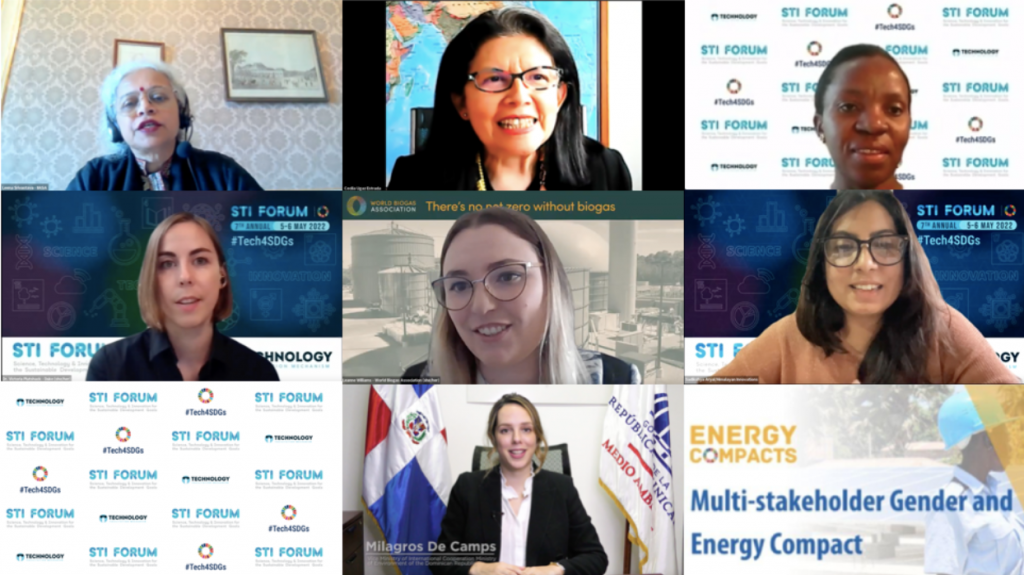
2022 SEforALL Forum
Designed to accelerate progress towards the delivery of SDG7, end energy poverty and advance a just transition, the 2022 SEforALL Forum was an exemplary platform to showcase the Compact’s efforts in the field.
Catalyzing action for a gender-transformative energy transition
UNIDO jointly with SEforAll, ENERGIA, and GWNET co-organized the side event, “Catalyzing action for a gender-transformative energy transition” on 18 May with a two-fold focus: to showcase the work of relevant organizations and their impact in women’s lives and to provide a space for women leaders to share their stories. The event kickstarted with a powerful intervention by Mary Robinson, Former President of Ireland, who stressed the need to break down barriers in the energy sector, so that women do not lose out, because “when women lose out, we all lose out.” Along this line, Ms. Robinson stated that “gender equality and women empowerment initiatives not only transform gender norms, but boost resilience across the world– from the economy in general, to individual communities.”
Furthermore, Benedikt Hoskuldsson, Special Envoy for International Affairs and International Development of Iceland, reiterated Iceland’s support for the gender and energy compact, emphasizing women’s critical role in sustainable energy. The session was joined by Rethabile Mafura, Country Director at African Clean Energy, Huda Jaffer, Director at SELCO Foundation, Carlo Papa, Managing Director of Enel Foundation, Joyce Mendez, Regional Focal Point for Latin America and Caribbean at the SDG7 Youth Constituency, and Evita Moawad, International Sustainable Energy Expert at UNIDO, with moderation from Sheila Oparaocha, Director at ENERGIA.
Starting off discussions, Huda Jaffer delved into the various ways we can increase diversity in our workplaces, stating that “we can push stakeholders to have ambitious gender targets, which will help us identify existing channels to increase the participation of women in energy.” This thread on the importance of organization’s in the energy transition was picked up by Carlo Papa, who shared that “we need to offer an outstanding value proposition and converge efforts with others with the same goals to increase the pace of the energy transformation.”
On her part, Joyce Mendez stressed that also young and indigenous women must be involved in the energy transition. “It’s important to listen and learn from each other. The gender and energy nexus depends on interculturality. We can bring a change if we understand our realities and our communities’ needs.” She added that women must have a seat at the table, especially when it comes to developing and implementing new energy projects that must respect cultures, territories and norms in order to benefit the whole community. “Flexibility is needed when providing opportunities for women with different realities. Funding is fundamental, as well as training for accessing funding, in different languages.”
The “Women in Clean Cooking” (WICC) mentorship program, is organised by the Clean Cooking Alliance (CCA), Sustainable Energy for All (SEforALL) and the Global Women’s Network for the Energy Transition (GWNET), and aims to support early to mid-career women working in the clean cooking sector across Africa and Asia. Rethabile Mafura, as alumni of this mentoring programme, expressed that the mentorship program changed her life. “It inspired hope! By the end of the program I had been promoted from Human Resources to country director, because I was given an opportunity. Ladies, we should take advantage, we should apply.”
Wrapping up the inspiring discussion , Evita Moawad, pointed out that we must ensure that the needs and priorities of women and girls are prioritised in designing energy solutions and that women should have equal opportunities to lead and benefit from the energy transition. “The Gender and Energy Compact was set up to galvanise concrete commitments for gender in the energy transition.”
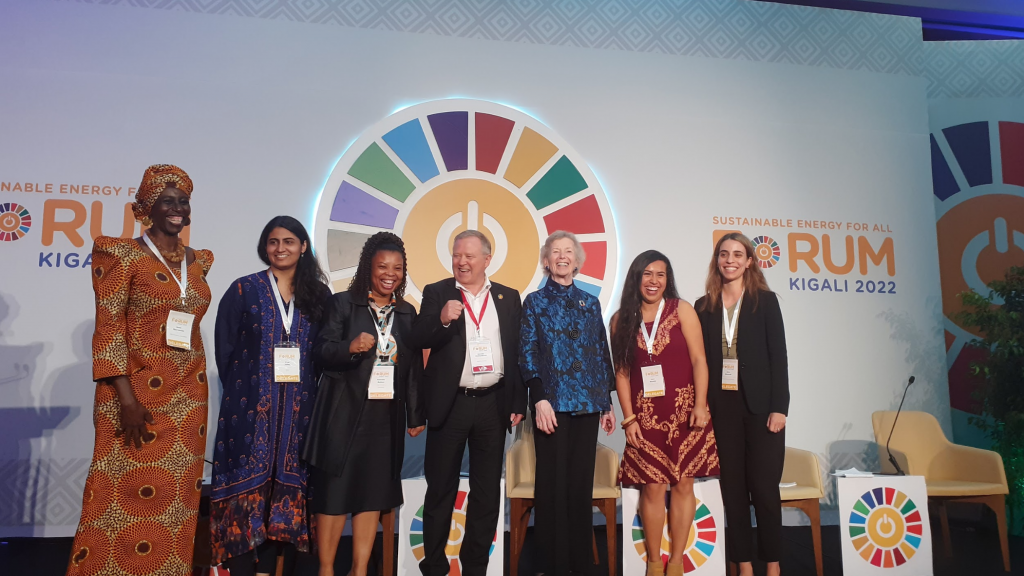
In Her Voice: Entrepreneurship in the Last Mile
As part of their commitment under the Gender and Energy Compact ENERGIA and Solar Sister, co-hosted a session to discuss women entrepreneurs’ needs, challenges, and successes and their journey to transform access to clean energy at the community level at the SEforAll Forum.
Moderated by Olasimbo Sojinrin, Solar Sister Country Director, Nigeria, and Sheila Oparaocha, the event featured three women entrepreneurs from rural areas in Africa, who shared their experience on how access to clean energy has empowered them economically and how they, in turn, contribute to energy access and the just energy transition. The women entrepreneurs on the stage represented thousands of other entrepreneurs who are key drivers in the clean energy transition, especially in under-served communities.
In opening the session, Sheila Oparaocha remarked that “it is important to acknowledge that access to energy and the impacts of energy poverty are strongly differentiated by gender: as main caretakers in the households, women bear the biggest brunt of energy poverty, particularly but not exclusively in developing countries, in rural and remote areas.” Despite the challenges, women are agents of change and play a unique role in raising awareness on the adoption of clean energy solutions and in empowering their communities and advancing gender equality.
Adebola Eunice Oladejo, Solar Sister Entrepreneur from Nigeria, discussed the rewards and challenges of bringing clean and affordable light to off-grid communities. “Since becoming a Solar Sister Entrepreneur, I am a more confident woman knowing that I am knowledgeable about solar energy and the solar industry.” said Adebola, who noted how she increased her status and has also become more financially stable since she joined Solar Sister.
Millicent Odira from Kenya said that she is “proud to be the CEO of Mildra Green energy and Technology. This business has allowed me to create a clean environment in my community and to bring a change among women and young people“.
Rose Sagna, a market gardener from Senegal, highlighted the challenges women entrepreneurs face, including access to property and finance. “The main difficulty that entrepreneurs, especially women, have in switching to solar is that they don’t have bank guarantees to obtain credit. Women don’t have enough income to buy the products in cash. Personally, I had no guarantees. Thanks to a financing model that Energy 4 Impact put in place, I was able to get the solar pump”. This inclusive financing model for solar productive use technologies in the agricultural sector is a model that is being recognised by the Government of Senegal and by GIZ and it is going to be scaled up nationally.
In closing, Olasimbo Sojinrin reiterated that energy is not gender neutral, and the challenges associated with energy poverty are multiple.
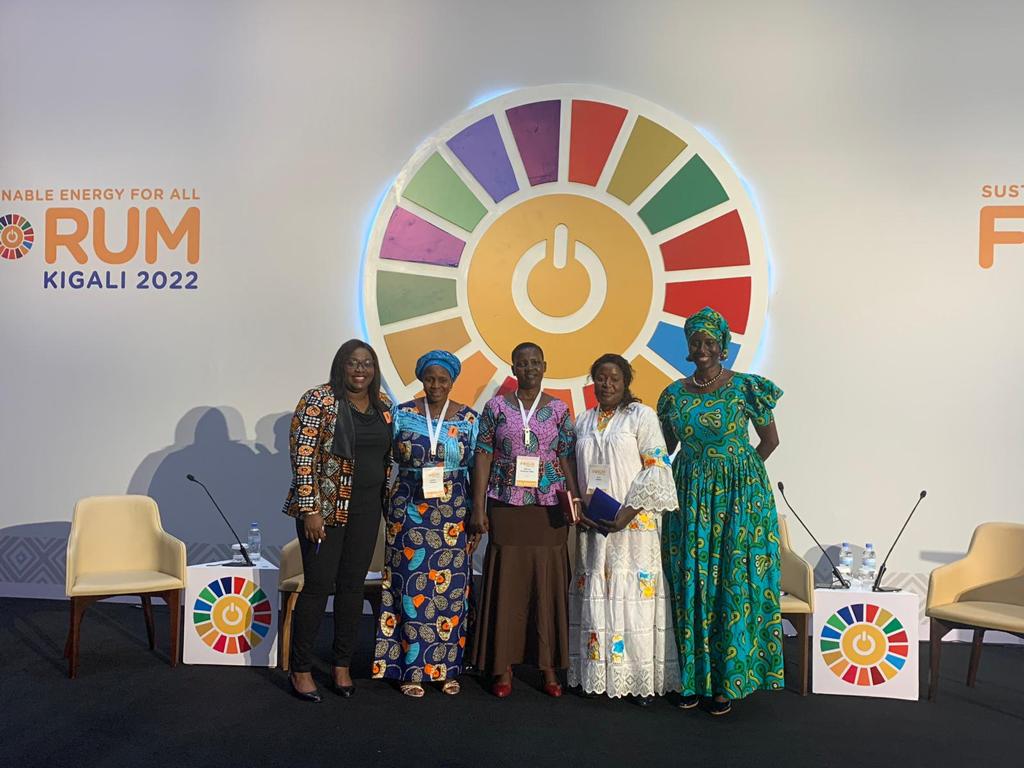
Stockholm+50
On June 2 and 3, governments, civil society, international organisations, young people and the private sector gathered in Stockholm to discuss how to tackle the Earth’s triple planetary crisis – climate, nature, and pollution. Convened by the United Nations General Assembly, the four plenary sessions and the numerous side events and webinars represented a tremendous opportunity to spur bold and urgent action to deliver the Sustainable Development Goals, the Paris Agreement and encourage the adoption of green post-COVID-19 recovery plans.
The side event “Achieving a healthy planet for all through a gender-just recovery” co-organized by the GGKP Gender Expert Group, UNEP, GGGI and UN Women explored why the concept of “just transitions” and gender equality are central components of global environmental and climate action and how disadvantaged groups can be socially and economically empowered to participate and benefit from recovery strategies. Moderated by Ingvild Solvang, Head of Climate Action and Inclusive Development at the Global Green Growth Institute (GGGI), the event featured Sheila Oparaocha, Director at ENERGIA, Madeleine Diouf Sarr, Chair of the Least Developed Country (LDC) Group of climate negotiators in the UNFCCC, Sarah Hendriks, Director Programme, Policy and Intergovernmental Division, UN Women, Bhavna Choudhury, Founder and Principal Coordinator of The Indegenous, Pem Narayan Kandel, Secretary at Ministry of Forests and Environment, Government of Nepal, and Asad Naqvi, Head of the Secretariat of The Partnership for Action on Green Economy. Panelists shared their vision and recommendations to strengthen gender-transformative actions and ensure that no one is left behind. Panelists reiterated that it is fundamental to support institutional changes through policies and practice and ensure that the voices of the disadvantaged are heard in the decision-making process.
Sarah Hendriks highlighted that income inequalities have increased more than any other time in history, global care crisis left millions without the support they need while imposing harsh choices and enormous costs on women and girls and an accelerating climate and environmental crisis is taking its toll disproportionately on the poorest countries and the most marginalized women and girls. “Energy is cross-cutting and an enabler to reach the 2030 Agenda and the 2050 climate targets. Energy is required for our economic growth, social development as well as climate adaptation and mitigation measures,” said Sheila Oparaocha in opening the session. She stressed that “in order to achieve a just, inclusive and gender-transformative transition, we need to identify actionable measures” and that “renewable energy serves as an opportunity to invest in labour saving technologies that address women’s time poverty and reduce drudgery, but also increases women’s productivity. Gender responsive policies and legal frameworks provide an enabling environment that can drive markets and actions at national, sub-national and global level. Financing for gender-focused actions is critical to foster investments in women’s businesses.” As leading partner of the Gender and Energy Compact, Sheila Oparaocha reminded that “partnerships and multi-stakeholder actions are critical to bring the change that is necessary to reach SDG5 and SDG7”.
In a very powerful speech, Bhavna Choudhury reminded the importance of including all disadvantaged groups, including indigenous communities who often bear the burden of the climate crisis, and stressed the need to accelerate systemic change. “The actions that needed to take place 30 years ago were not done and here we are, here I am – feeling like a token. … We are not at the point where we can have the same conferences and expect different results. The money is not going where it needs to. Our communities have lost train stations, access to food, access to internet. The climate crisis is now. She called for bold, urgent and honest action on climate change that transforms words into actions. “We don’t need to reinvent the wheel. The solutions are there. Traditional communities have access to knowledge that has been transferred orally throughout generations and these solutions need to be promoted. They need to be turned into actions.”
The recording is available here: https://youtu.be/2zmsAUSA6Ms


